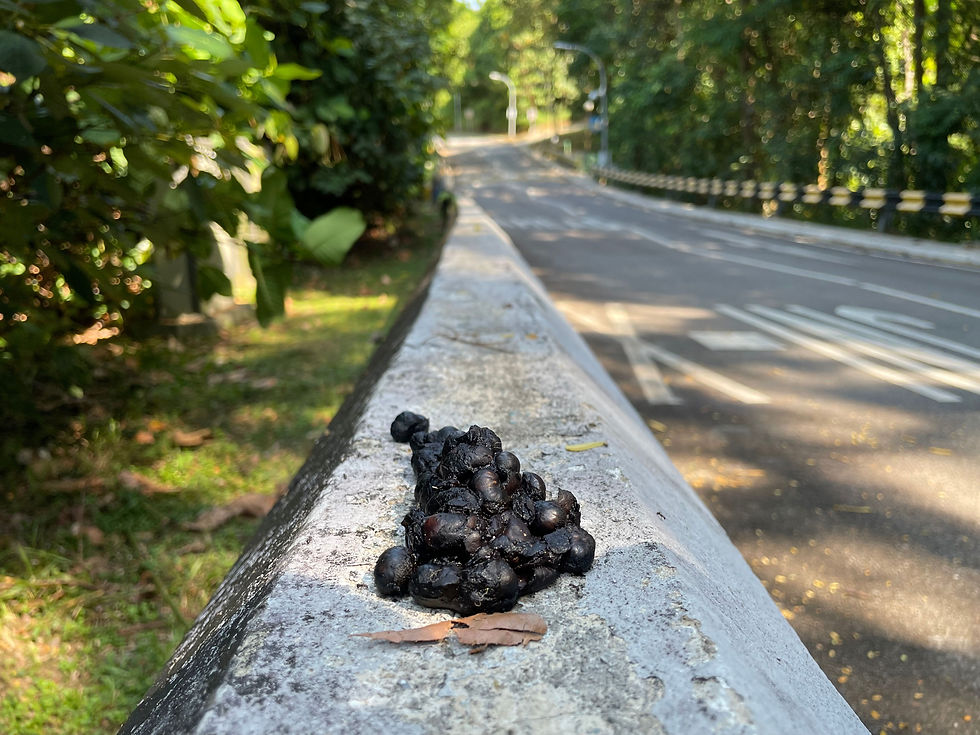Have you met our nocturnal gardener?
- NUS Toddycats
- Aug 10, 2023
- 3 min read
Updated: Jan 8
Jointly written by Xu Weiting and Fung Tze Kwan, Civet Researchers
August 2023
Have you ever come across this little black pile of seeds? You might have encountered them along pavements, on nature trails or even around your home garden. These bubble tea pearls look-alike are actually seeds defecated by a common palm civet (Paradoxurus musangus). This is a tell-tale sign that a civet visited recently and a close examination of the poop contents allows us to have a glimpse of its last meal. This poop contains seeds from the fishtail palm (Caryota mitis), a common wayside plant which civets are frequently feed on.

Common palm civets are omnivorous. While the majority of their diet consists of fruits, they also feed on small animals such as insects and small birds. Because of their high fruit intake and mobility, civets play an important role as seed dispersers for forest regeneration, depositing and sowing little seed packets through their excrement. These seemingly insignificant deposits contain many seeds that can germinate and eventually grow into fruiting trees that in turn support other wildlife.
What does the animal look like? The common palm civet is a small to medium-sized mammal that has persisted and can adapt to urban living. Besides occurring in their natural habitats in forested areas, they also inhabit urban neighbourhoods with pockets of natural vegetation that provide food and shelter. At night, they might be easily mistaken to be cats, but they can be easily differentiated by their long dark tails, a dark facial mask around their eyes and their ability to scale vertical heights (e.g. trees or walls). Their pandan-like musky smell often gives them away (but remember to check that there are no pandan plants nearby!), which civets use as a form of communication with other civets. They are not easy to spot as they are typically active at night and are shy and quiet. Furthermore, civets are typically solitary and are only found in groups when a female has young.

Coming across a civet for the first time might be unnerving, but they mean no harm and are usually shy creatures. Observe them from a distance and you might be able to catch a glimpse of it showing off its climbing prowess by scaling up high walls or trees with ease or going around the neighbourhood looking for fruits.
If you are a lucky house owner who gets visited by a civet family, the antics of the young civets can be a joy to watch. Young civets are playful, sometimes clumsy, and tend to vocalise more to communicate with others in their family. Baby civets depend and learn their survival skills from their mum and they practice these skills by following her to forage. However, being solitary animals, these juvenile civets would eventually grow up and leave their mom to find and explore new territories.

As a nocturnal and shy mammal, civets could feel unfamiliar and mysterious to the general public, adding to people’s fear and misunderstanding towards them. In recent times, there have been an increasing number of news articles of civets being negatively affected by encounters with people:


A young civet in a coffee shop which sustained severe burn injuries during a failed rescue operation and had to be eventually euthanised.

In neighbourhoods where fruits are plentiful, civets can be comfortable enough to venture out to explore these areas and can be observed occasionally. We hope that people who have an encounter with them would not immediately request for their removal, but to understand that they do have an important role to play in the ecosystem and consider sharing their space. As Singapore progresses towards a City in Nature, we hope more citizens will care to learn about our wildlife neighbours and have more empathy for them so that human-wildlife coexistence can become a reality.

For more information on civets in Singapore, visit the Common Palm Civet Facebook page.
If you encounter injured civets or civets in distress, call 24-hour NParks Animal Response
Centre at 1800 476 1600 or ACRES 24-hour Wildlife Rescue Hotline at 9783 7782 for assistance. If you would like to highlight a civet sighting that you had, you can submit a record here to http://mammal.sivasothi.com/
Follow NUS Toddycats to learn more about civets:
 | Website: www.toddycats.wordpress.com Facebook: www.facebook.com/nustoddycats Instagram: www.instagram.com/nustoddycats |
Visit our civets information page and download our advisory to get tips on what you can do when you encounter one:

Kommentare